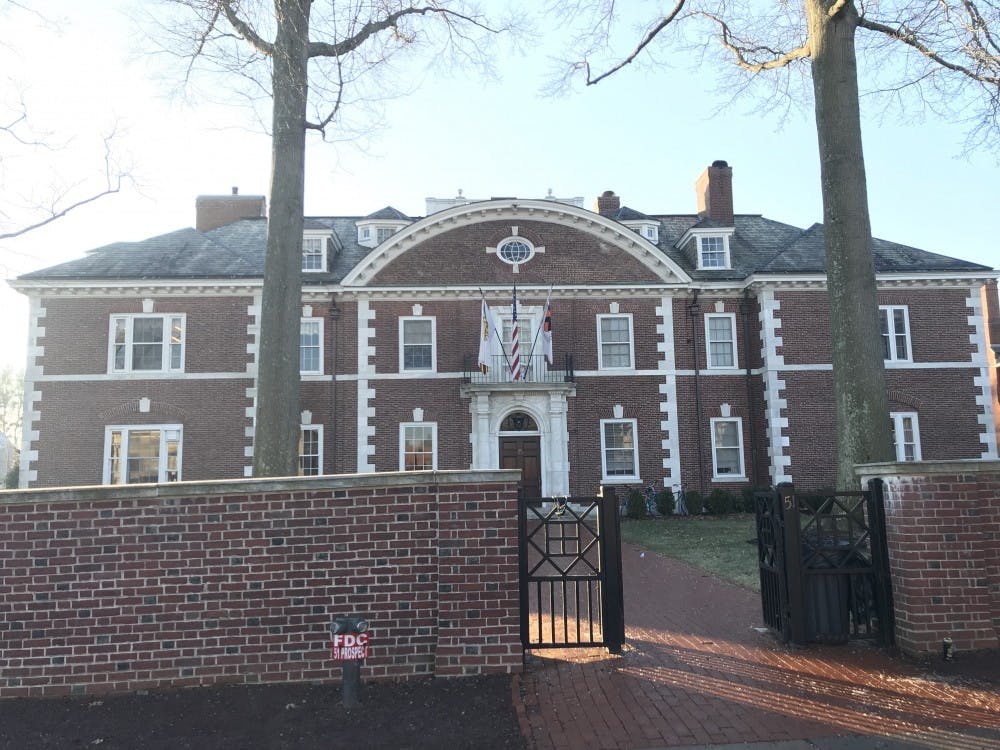When sophomores enter eating clubs’ doors this week, they may get the gut feeling that nothing they do or say matters in Bicker. Rumors about affiliations’ role on the Street have swirled for years and haunt Real Talk Princeton posts. But there’s never been definitive evidence to prove any of this gossip.
Until now.
My latest investigation found that varsity sports feed into specific eating clubs. I used the meal exchange website to compile membership lists, and I analyzed Princeton's athletics rosters to track who goes where on Prospect Avenue.
Cannon Dial Elm Club has either a majority or plurality of athletes in eight sports, Cottage Club in four, Cloister Inn in three, and Tiger Inn in two; Tower Club and Ivy Club each have one.
Colonial Club, Terrace Club, Quadrangle Club, and Charter Club, combined, have less than 1- varsity team members — a mere 1 percent of athletes on the Street — despite accounting for 27 percent of all students in eating clubs.
Feeding sometimes depends upon a team’s gender or classification within a sport. For example, all of the upperclassmen in men’s hockey are in Cottage. But all of the female players went to Cannon.
Interestingly, weight classes split men’s rowing. Two-thirds of lightweight rowers are Cloister members versus only 20 percent of heavyweight rowers. Instead, 70 percent of the heavyweights joined TI, Ivy, or Cottage.
In several cases, a few teams dominate entire eating clubs. The rowing, swimming, and diving teams are 59 percent of Cloister’s members. Football, basketball, and track and field compose almost half of Cannon.

Not many athletes forgo eating club membership. Twelve percent are independent or on residential college meal plans, which is 29 percent lower than upperclassmen overall.
Varsity players are over-represented in Bicker clubs by a factor of nearly two compared to the Princeton student body at large.
The Undergraduate Student Government’s COMBO survey previously found that athletes are 50 percent more likely to Bicker and are accepted at rates 34 percent higher than non-athletes.
A 2013 independent sophomore-run survey concluded that athletes had an advantage in TI, Ivy, and Cottage’s admissions.

The presidents and Bicker chairs of Ivy, TI, Cottage, Cannon, Tower, and Cloister declined to comment or had not responded to requests for comment at the time of publication.
* * *
Implications
Bicker is often presented as a socially meritocratic process. Smile, be interesting, don’t try too hard, and a club will grant you a golden ticket of acceptance. As Ivy’s former alumni board president James Q. Griffin ’55 eloquently put it for the New York Times, “It’s a Jeffersonian democracy, taking the natural aristocracy, as you were.”
But the facts show: which people you know matters more than what you say or who you are.
“This club cares about affiliations,” a Cottage member once told The Observer. Athletes have an unequivocal edge in Bicker. Getting into a selective club requires garnering enough support from current members or, in the case of Ivy, consistently receiving high scores from interviewers. Both tasks are easier to do with prior connections to members and experiences in their clubs.
Meeting upperclassmen is understandably hard for first-years and probably challenging even for most sophomores. Social life at Princeton revolves around meals. By not eating in residential colleges, juniors and seniors are far removed from underclassmen life.
But it’s different for athletes. They form tightly knit groups upon entering the University. Opportunities abound for them to engage in meal exchanges with and get party passes from their senior teammates.
“It is the intention of no president to use specific affiliations as feeders to the clubs,” the Interclub Council wrote in a press release last year. I commend the Street’s leaders for taking this progressive position. But nothing will change as long as there is a process in which athletes can vouch for their teammates.
My data raises the question of why Bicker continues to exist. If particular groups are practically guaranteed to get in, why not go all out by being more like Harvard’s final clubs or Yale’s secret societies, which students join only if invited? Pull back the metaphorical stage curtain to reveal what it actually is and save everyone else from spending six hours in interviews.
That’s not to say that no unaffiliated student has ever bickered successfully or that an athlete has never been hosed. But the odds are clearly weighted in favor of certain people long before “Street Week” starts.
Cloister is an interesting outlier as a sign-in club. Eighty-four percent of athletes on the Street are in Bicker clubs. Yet several dozen players have snubbed exclusivity. They could be forward-thinking. Some may have needed somewhere to go after getting hosed, or perhaps few non-athletes want to join it because of a possibly cliquey atmosphere of “floaters and boaters.” Though it’s hard to say, a bit of each may be true.
In any case, teams are still sticking together.
Over the past few years, I’ve heard plenty of athletes complain about the social chasm between their teams and the rest of the student body. I used to sympathize for them. It’s a Herculean effort to balance strenuous practices and Princeton’s unbearable workload.
After seeing this data, however, I no longer feel the same way. In sophomore spring, athletes are free to meet new people by signing in or bickering clubs with members of different interests. Nothing is stopping them from socializing with their teammates in practices and with another set of friends during dinners.
Instead, the vast majority keep joining the same three athlete-dominated clubs, reinforcing the very divisions that they claim to loathe.
Liam O’Connor is a junior from Wyoming, Del. He can be reached at lpo@princeton.edu.








